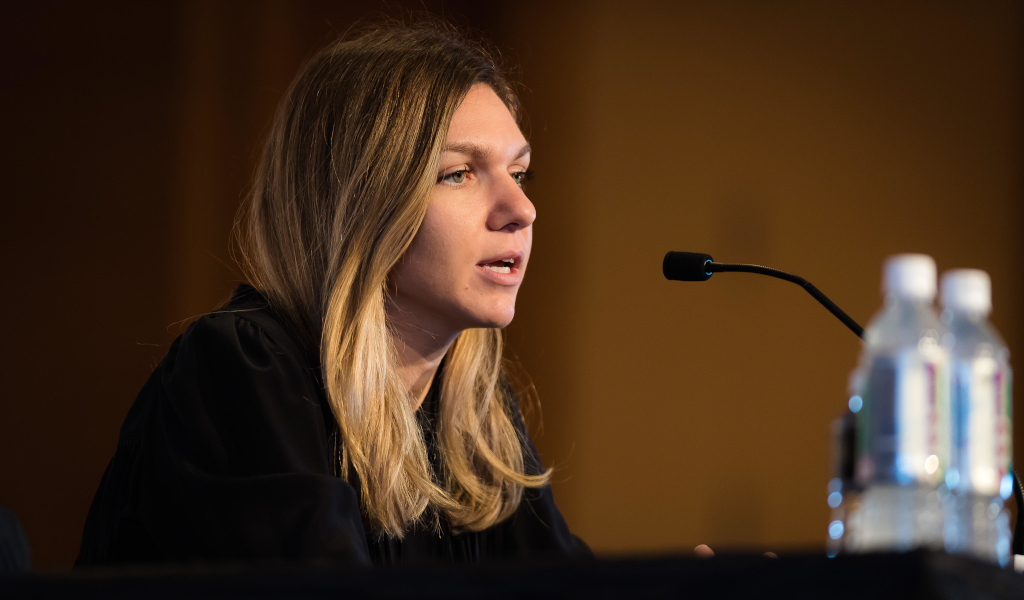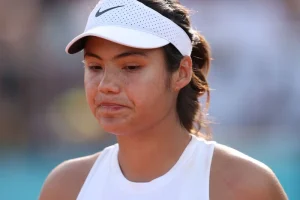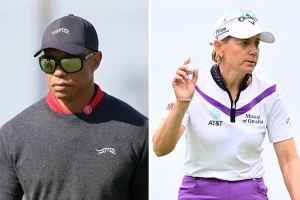
Simona Halep
Simona Halep has started her appeals against a four-year ban for doping offences, as she looks to overturn some alarming evidence that has stacked up against her.
The 2019 Wimbledon champion had been provisionally suspended since last October having tested positive for the blood-boosting drug roxadustat at the 2022 US Open and she was subsequently charged with irregularities in her Athlete Biological Passport (ABP).
After an investigation into the findings, a four-year ban was imposed last September, effectively ending her tennis career.
Roxadustat is a drug used to treat anaemia, but it is banned in sport due to its potential to boost the production of red blood cells in the body. Its effect is similar to EPO, the doping product that has plagued major endurance sports including cycling’s Tour de France.
It is also used to treat kidney disease but can have negative side effects.
Roxadustat is reported to increase VEGF, a signal protein that can activate tumour growth and also is considered to cause pulmonary hypertension.
HALEP’S DEFENCE
Simona Halep has taken to social media several times over the past year to voice unhappiness at the time the process was taking, gave evidence at the tribunal in London on June 28 and 29.
She argued roxadustat had got into her system via a contaminated supplement but, while the tribunal accepted she had taken such a substance, it “determined the volume the player ingested could not have resulted in the concentration of roxadustat found in the positive sample”.
The Athlete Biological Passport programme collates various blood parameters over time to spot any inconsistencies in the data that could indicate a possible doping offence.
The charge was also upheld, with the tribunal deciding “they had no reason to doubt the unanimous ‘strong opinion’ reached by each of the three independent Athlete Passport Management Unit experts that ‘likely doping’ was the explanation for the irregularities in Halep’s profile.”
The 31-year-old, who also won the French Open in 2018 and is the highest-profile tennis player to fail a doping test since Maria Sharapova in 2016, quickly issued a statement confirming she would appeal.
“A tribunal under the Tennis Anti-Doping Programme announced a tentative decision in my case,” said Halep.
“The last year has been the hardest match of my life and unfortunately my fight continues. I have devoted my life to the beautiful game of tennis.
“I take the rules that govern our sport very seriously and take pride in the fact I have never knowingly or intentionally used any prohibited substance. I refused to accept their decision of a four-year ban.
“While I am grateful to finally have an outcome following numerous unfounded delays and a feeling of living in purgatory for over a year, I am both shocked and disappointed by their decision.
“I intend to appeal this decision to the Court of Arbitration for Sport and pursue all legal remedies against the supplement company in question.”
Halep again criticised the International Tennis Integrity Agency, which oversees the sport’s anti-doping programme, saying: “The ITIA brought an ABP charge only after its expert group learned my identity, causing two out of three to suddenly change their opinion in favour of ITIA’s allegations.
“The ITIA relied solely on the opinions of these experts who looked only at my blood parameters – which I’ve maintained for more than 10 years in the same range.
“This group ignored the fact no prohibited substance has ever been found in my blood or urine samples with the sole exception of one August 29 positive test for roxadustat, which was present at an extremely low level and which, when considering my negative test three days prior, could only have been caused by accidental exposure to roxadustat.
“I am continuing to train and do everything in my power to clear my name of these false allegations and return to the court.”
If her appeal is unsuccessful, Simona Halep will not be eligible to compete again until October 7, 2026, when she will be 35.
THE COACH SPEAKS OUT
In a twist to the case, Halep’s former coach Patrick Mouratoglou has admitted his team administered the substance that contained roxadustat to Simona Halep, as he appeared to accept responsibility for the failed drug test.
“I feel responsible for what happened because it’s my team, so me basically me, who brought her this collagen,” said Mouratoglou in an Instagram post.
“It opened my eyes to the fact that any athlete can become contaminated tomorrow because apparently, this happens more and more.
“This is terrible because you are completely innocent, your reputation is impacted, hurt by the fact that your name has to do with doping even though you didn’t do any doping.
“Your career is stopped for a period of time that is extremely long. It can affect your whole career, it affects your reputation for a very unfair reason because you have done nothing.
“So it opened my eyes that it can happen to anyone, and the companies that you decide to go with for supplements, you have to be sure at 100% that this cannot happen.”
“I feel confident for the future of Simona with her appeal to the CAS, because it’s an independent tribunal,” he said.
“We have done all possible tests to be able to establish that we are talking about contamination. I’m very confident that this independent tribunal will recognize the fact that she never did doping.
“She is a victim and she has to come back to the court and be able to compete as soon as possible.”
While Halep may be an unfortunate victim of a mistake from her coaching team, she faces an uphill battle to win her appeal as the reality is athletes are responsible for any substance they consume.
The tennis world will await the outcome of an appeal that will have implications for the reputation of Mouratoglou and his coaching team amid their role in this story.
WHAT HAPPENS NEXT?
Halep has been adamant that she did not take Roxadustat intentionally, but that defence may not be enough to ease the punishment she has been given.
Leading her defence team is Howard Jacobs, the American lawyer who represented Sharapova in her doping case, as well as a number of top athletes and Olympians who have been caught up in doping cases.
The final decision in this case could be months in coming, with Halep’s career drifting away with each passing day and month that she spends on the sidelines.





